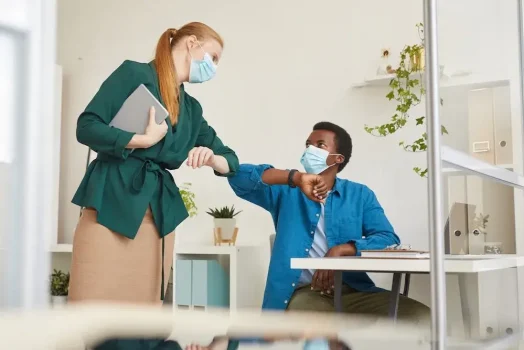Lockdowns across the globe during the COVID-19 pandemic left many feeling isolated. With restrictions now being lifted in many parts of the world, people are once again becoming free to gather in large groups and enjoy public settings and events. While many are looking forward to being able to socialize, others are overwhelmed with anxiety at the prospect of interacting with crowds. After experiencing a year of lockdowns and being confined to our homes, it is not unusual to feel hesitant about returning to “normal.”
There are many different factors that contribute to post-pandemic anxiety, from the loss of loved ones to pre-existing anxiety disorders that have worsened due to increased stresses and fears. Below, we’ll explore some of the most common reasons many are anxious about getting back out into the world.
The Brain Needs Time to Adjust
When restrictions and lockdowns were first implemented and the world as we knew it abruptly changed, it took our brains some time to adjust to the new reality we were faced with. Now, after more than a year, our reality is once again changing. Therefore, our bodies and brains may simply need time to adapt. It may require a high degree of patience, but the human mind is resilient and will eventually adjust once again.
However, if someone feels they are unable to or experiencing extreme difficulty in “getting back to normal,” they should seek the assistance of a mental health professional. A trained therapist will be able to help an individual work through any mental blocks they may have about navigating the post-pandemic world.
Negativity on Social Media and the News
While it is important to stay informed about the latest information regarding COVID-19, listening to the news can quickly become overwhelming. The constant flow of conflicting information and opposing voices has left many feeling confused and unsure about how safe they really are outside their homes. Adding to that is the constant battle on social media between scientific facts and misinformation.
The best way to combat this is for a person to listen to healthcare professionals and educate themselves about the difference between hard facts and oversensationalized opinions or misinformation.
There is Still No Guarantee That You Won’t Get Sick
It may seem that the worst is over now that there are multiple effective vaccines available to the general public, and many health experts firmly believe this to be the case. However, as social distancing measures loosen in countries throughout the world, there are still a few legitimate reasons why it may be wise to be cautious in a “post-pandemic” world.
There have been many “breakthrough” cases of vaccinated people becoming infected with COVID-19 across the world. Although symptoms are typically less severe than if unvaccinated, there is still the possibility of getting friends and loved ones sick. Additionally, those with compromised immune systems still face increased risks.
COVID-19 is Still New
Although it may seem as though the pandemic has been going on forever, it is, in fact, less than two years since the first case was detected. Scientific knowledge of the COVID-19 virus is still very much in its infancy. There is still much uncertainty surrounding the virus’ ability to evolve and how future variants will affect people.
In addition, there are doubts about the vaccines’ ability to maintain their effectiveness in the face of possible mutations. It is understandable that a person might feel uncertain about their safety in the face of so much new and sometimes conflicting information. The ever-changing nature of the advice of the CDC and the World Health Organization on wearing masks, being able to be in groups whether that is indoors or outdoors, has been confusing for those who are trying to remain practicing the safest protocols possible.
Many People Are Not Getting Vaccinated
Many people have decided not to be vaccinated due to the abundance of misinformation that has been circulating since the beginning of the pandemic. Medical experts are concerned that the number of unvaccinated people could make it difficult to prevent future outbreaks. It is important to remain conscious of the risks that everyone still faces.
While it is still possible to contract the coronavirus after being vaccinated, it is much less likely. Moreover, studies have shown that those who have been vaccinated are able to recover more quickly, experience fewer symptoms, and are at a much lower risk for experiencing severe complications associated with COVID-19.
Life Adjustment Team Can Help
If you or a loved one are struggling with anxiety about returning to work and getting back out in the world, LAT can help. Our assertive community treatment model of case management brings care to our clients where they are, in their homes and communities, in order to effectively treat all aspects of an illness. Over the last 40 years, our team has helped countless individuals gain self-confidence, find direction, and overcome their problems. We provide personalized, one-to-one care based on your priorities and your needs so you can meet your goals and make progress towards recovery. Contact our Clinical Team to get started today!








